- Home
- W. Somerset Maugham
The Summing Up Page 10
The Summing Up Read online
Page 10
I had no intention of fizzling out with a passing success, and I wrote my next two plays to consolidate my hold on the public. They were a little bolder and, mild and unsophisticated as they must seem now, they were attacked by the more strait-laced for their indecency. One of them, Penelope, must have had some merit, for when it was revived in Berlin twenty years later it filled the theatre for a whole season.
I had by now learnt all that I was ever able to learn of the technique of the drama, and with the exception of The Explorer, which for a reason I saw very clearly had failed to please so well, I had had an uninterrupted series of successes. I thought it time to try my hand at more serious work. I wanted to see what I could do with more complicated subjects, I wanted to make one or two small technical experiments which I thought would be theatrically effective, and I wanted to see how far I could go with the public. I wrote The Tenth Man and Landed Gentry, and finally, after it had been lying in my desk a dozen years, produced Loaves and Fishes. None of them was a failure; none of them was a success. The managers neither made nor lost money on them. Loaves and Fishes failed to have a long run because the public of that day was uneasy at seeing a clergyman made fun of. The play is written somewhat extravagantly, so that it suggests farce rather than comedy, but it has some amusing scenes in it. The others fell between two stools. One portrayed the narrow, hide-bound life of country gentlefolk; the other, the political and financial world; with both of which I had some acquaintance. I knew that I must interest, move and amuse, and I heightened the note. They were neither frankly realistic nor frankly theatrical. My indecision was fatal. The audiences found them rather disagreeable and not quite real. Then I took a rest for two years and at the end of it wrote The Land of Promise. This had been played to crowded houses for some months when the war broke out. I had produced ten plays in seven years. The intelligentsia, having passed judgement, ignored me, but I was securely fixed in the public favour.
34
FROM time to time I had a good deal of leisure during the war; at first because the work I was doing took up but part of my day, and to write plays was a convenient means of distracting attention from the activities I was engaged in; and later, when, having contracted tuberculosis, I had to lie long in bed, because it was a pleasant way of passing the time. I wrote a series of plays in quick succession. It began with Our Betters, which was written in 1915, and ended with The Constant Wife, which was written in 1927.
Most of these plays were comedies. They were written in the tradition which flourished so brightly in the Restoration Period, which was carried on by Goldsmith and Sheridan, and which, since it has had so long a vogue, may be supposed to have something in it that peculiarly appeals to the English temper. The people who do not like it describe it as artificial comedy and by the epithet foolishly think they condemn it. It is drama not of action, but of conversation. It treats with indulgent cynicism the humours, follies and vices of the world of fashion. It is urbane, sentimental at times, for that is in the English character, and a trifle unreal. It does not preach: sometimes it draws a moral, but with a shrug of the shoulders as if to invite you to lay no too great stress on it. When the busy Monsieur de Voltaire went to see Congreve to discuss the current drama with him, Mr. Congreve pointed out to him that he was a gentleman rather than a dramatist. The interviewer answered: ‘If you were nothing but a gentleman I should not have troubled to call upon you.’ Monsieur de Voltaire was certainly the wittiest man of his age, but here he showed want of intelligence. Mr. Congreve’s remark was profound. It showed that he knew very well that the first person the author of comedy must consider from the standpoint of comedy is himself.
35
I HAD by then made up my mind on many things connected with the drama.
One of the conclusions I had come to was that a prose play was scarcely less ephemeral than a news sheet. The playwright and the journalist need very similar gifts, a quick eye for a good story and a telling point, animation and a vivid way of writing. All the dramatist needs besides is a specific knack. I do not know that anyone has been able to discover what this knack consists of. It cannot be learnt. It can exist without education or culture. It is a faculty that enables the playwright so to put words that they carry across the footlights and to tell a story, as it were stereoscopically, so that it visibly moves before an audience. It is a very rare faculty: that is why dramatists are so much more highly paid than other artists. It has nothing to do with literary ability as we know from the fact that the most distinguished novelists have generally failed lamentably when they have tried to write plays. It is a faculty, like that of being able to play by ear, of no spiritual importance. But without it, though your ideas may be profound, your theme original and your characterisation acute, you will never be able to write a play.
A good deal has been written about the technique of play-writing. I have read most of the books on the subject with interest. The best way of learning how to write a play is to see one of your own produced. That will teach you how to write lines that the actors find easy to say and, if you have an ear, how far you can carry the rhythm of a sentence without losing the spontaneity of conversation. It will show you what sort of speech and what sort of scenes are effective. But I think the secret of play-writing can be given in two maxims: stick to the point and whenever you can, cut. The first of these demands a logical mind. Few of us have it. One idea suggests another; it is very pleasant to pursue it, even though it is not directly concerned with the subject. The inclination to digress is human. But the dramatist must avoid it even more strenuously than the saint must avoid sin, for sin may be venial, digression is mortal. The principle is that of direction of interest. It is important in a novel too, but here greater space permits of greater latitude and, just as according to the idealists evil is transformed into the perfect good of the Absolute, so certain digressions may take their necessary part in the development of the main theme. (A very good example of this is the early history of the Elder Zossima in the Brothers Karamazov.) Perhaps I should explain what I mean by direction of interest. It is the method by which an author causes you to concern yourself with the fortunes of certain people under certain conditions and keeps you attached to them till he has reached his solution. If he lets you wander from the main point it is very likely that he will never recapture your attention. It is a psychological trait in human nature that interest is established in the persons whom the playwright introduces at the beginning of his play so firmly that if the interest is then switched off to other persons who enter upon the scene later, a sense of disappointment ensues. The astute dramatist presents his subject as early as possible, and if for theatrical effectiveness he does not introduce his principal characters till later, the conversation of the persons on the stage at the rising of the curtain concentrates the attention of the audience on them so that the delay in their appearance increases the expectation. No one followed this practice more scrupulously than that very competent dramatist William Shakespeare.
It is the difficulty of directing the interest that makes it so hard to write the plays that are known as plays of atmosphere. The best known of them, of course, are Chekov’s. Since the interest is not concentrated on two or three persons, but on a group, and since the theme is their relations with one another and the environment, the author must take care to counteract the natural inclination of the audience to concern themselves with one character or two more than with the rest. With the interest thus dispersed it is possible that the audience will not feel warmly about any of the persons of the play, and since the author must beware that none of his threads is more important than the other, and thus attracts more vividly the attention of the audience, every incident must be subdued to the minor key. So it is very difficult to prevent the audience from feeling a certain monotony, and because nothing, either incident or character, has been very forcibly impressed upon them they are very likely to take away with them, when the play is over, some confusion of spirit. In practice it has been show
n that such plays are only tolerable when they are perfectly acted.
Now I come to my second maxim. However brilliant a scene may be, however witty a line or profound a reflection, if it is not essential to his play the dramatist must cut it. Here it may serve him if he is also a man of letters. The pure dramatist looks upon it as something of a miracle that he should be able to put words on paper at all, and when they are there, out of his own brain, if not straight from heaven, he looks upon them as sacred. He cannot bear to sacrifice one of them. I well remember Henry Arthur Jones showing me one of his manuscripts and my surprise on noticing that he had written such a simple sentence as, will you have sugar in your tea? in three different ways. It is no wonder that people to whom words come so reluctantly should attach an inordinate importance to them. The man of letters is accustomed to writing; he has learnt how to express himself without intolerable labour and so can cut with fortitude. Of course every writer hits now and then upon a thought that seems to him so happy, a repartee that amuses him so much, that to cut it is worse than having a tooth out: it is then that it is well to have engraved on his heart the maxim, if you can, cut.
To do so is now more than ever necessary, for audiences are at once quicker-witted and more impatient than ever before in the history of the theatre. Plays have been written in such and such a way because they satisfied audiences. Audiences in the past seem to have been willing to sit out scenes that were elaborately developed and to listen to speeches in which the characters fully explained themselves. It is very different now, and the difference has been occasioned, I suppose, by the advent of the cinema. To-day, audiences, especially in English-speaking countries, have learnt to see the point of a scene at once, and having seen it want to pass on to the next; they catch the gist of a speech in a few words and having caught it, their attention quickly wanders. The author must curb his natural desire to get the full value out of a scene or to let his characters display themselves in ample expression. Indications are enough. They will be seized. His dialogue must be a sort of spoken shorthand. He must cut and cut till he has arrived at the maximum of concentration.
36
A PLAY is the result of a collaboration between the author, the actors, the audience, and, I suppose one must add now, the director. For the moment I will consider the audience. All the best dramatists have written with their eye on it, and though they have more often spoken of it with contempt than with good will they have known that they were dependent on it. It is the public that pays, and if it is not pleased with the entertainment that is offered it, stays away. A play does not exist without an audience. Indeed the definition of a play is a piece of writing in dialogue devised to be spoken by actors and heard by an indefinite number of persons. A play written to be read in the study is a form of the novel in dialogue in which the author for some reason of his own (obscure to most of us) has eschewed the ordinary advantages of narrative. A play that does not appeal to an audience may have merits, but it is no more a play than a mule is a horse. (Alas, all of us dramatists from time to time give birth to these unsatisfactory hybrids.) Everyone who has had to do with the theatre knows how strangely audiences affect plays; a matinée audience and an evening audience may see quite different plays. We are told that the Norwegian public looks upon Ibsen’s plays as comedies rich in laughter; the English public has never seen anything to laugh at in those harassing dramas. The emotion of the audience, its interest, its laughter, are part of the action of the play. It creates it in the same way as we through our senses from the objective data create the beauty of the sunrise and the peace of the sea. The audience is not the least important actor in the play, and if it will not do its allotted share the play falls to pieces. The dramatist then is in the position of a tennis player who is left on the court with nobody to play with.
Now the audience is a very curious animal. It is shrewd rather than intelligent. Its mental capacity is less than that of its most intellectual members. If these were graded from A to Z, decreasing with succeeding letters to the zero of the hysterical shop-girl, I should say its mental capacity would come round about the letter O. It is immensely suggestible; individuals will laugh at a joke they have not seen because others who see it do. It is emotional; but it instinctively resents having its emotions stirred and is always ready to escape with a giggle. It is sentimental; but will only accept sentimentality of its own brand: thus in England it will accept the emotions attached to the concept of home, but the concept of a son’s love for his mother only excites its ridicule. It is careless of probability if the situation excites its interest, a trait of which Shakespeare made extravagant use; but jibs at a lack of plausibility. Individuals know that they constantly give way to impulse, but an audience insists that every action must have its cogent reason. Its morality is the average morality of the crowd, and it will be sincerely shocked by a sentiment that will offend none of its members taken one by one. It does not think with its brain, but with its solar plexus. It is easily bored. It likes novelty, but a novelty that will fit in with old notions, so that it excites but does not alarm. It likes ideas, so long as they are put in dramatic form, only they must be ideas that it has itself had, but for want of courage has never expressed. It will not play if it is hurt or affronted. Its chief desire is to be assured that the make-believe is real.
In essentials audiences never change, but at different periods and in different countries at the same period they rise to different levels of sophistication. The drama pictures the manners and customs of the day, and in its turn affects them, and as these change minor changes follow both in the trappings of a play and in its themes. The invention of the telephone, for instance, has made many scenes redundant, has quickened the pace of plays and has made it possible to avoid certain improbabilities. Probability is a variable factor. It is merely what the audience is prepared to accept. Often there is no rhyme or reason for this. People leave compromising letters about or accidentally hear things they are not supposed to hear as often as they did in Elizabethan times, and it is merely a convention that rejects such incidents as improbable. But what is more important is that there has been a change of heart among us, owing to changes in civilisation, and so certain themes that dramatists favoured have now fallen into desuetude. We are less revengeful than we were, and now a play devoted to revenge would be scarcely plausible. Perhaps because our passions are less strong, perhaps even because the teaching of Christ has at last penetrated our thick heads, we look upon revenge as discreditable. I ventured once to suggest that the liberation of women and their new-won sexual freedom had so altered men’s views on the importance of chastity that jealousy was no longer a theme for tragedy, but only for comedy; but this observation was received with so much indignation that I will not enlarge upon it.
37
I HAVE given this little analysis of an audience because the nature of the audience is for the dramatist the most important of the conventions within which he must work. Every artist must accept the conventions of the art which he pursues, but it may be that these are of such a nature as to make the art a minor one. It was a poetic convention in the eighteenth century that enthusiasm was objectionable and that imagination must be curbed by reasonableness; so it was only minor poetry that was produced. Now, the fact that the general mentality of an audience is so very much lower than that of its more intellectual members is a factor that the author must deal with. I think it definitely reduces prose drama to a minor place. It has been noticed over and over again that, intellectually, the theatre is thirty years behind the times, and the intelligent, owing to its poverty of thought, have largely ceased to frequent it. I have a notion that when the intelligent look for thought in a playhouse, they show less intelligence than one would have expected of them. Thought is a private thing. It is the offspring of reason. It depends on the mental capacity of the individual and on his education. Its communication is private from the mind that conceives it to the mind that is prepared to receive it, and if one man’s meat is another
man’s poison, still more is one man’s thought another man’s truism. But an audience is affected by mass suggestion, and mass suggestion is excited by emotion. I have hazarded the opinion that if you classified the members of an audience from A to Z, starting, say, with the critic of The Times and ending with the girl who sells sweet-stuffs in a shop off the Tottenham Court Road, its mental capacity would stand about the letter O. How can you write a play of which the ideas are so significant that they will make the critic of The Times sit up in his stall and at the same time induce the shop-girl in the gallery to forget the young man who is holding her hand? The only ideas that can affect them when they are welded together in that unity which is an audience, are those commonplace, fundamental ideas that are almost feelings. These, the root ideas of poetry, are love, death and the destiny of man. It is not any sort of dramatist who can find anything to say about them that has not been said a thousand times already; the great truths are too important to be new.

 The Skeptical Romancer: Selected Travel Writing
The Skeptical Romancer: Selected Travel Writing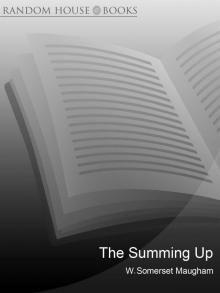 The Summing Up
The Summing Up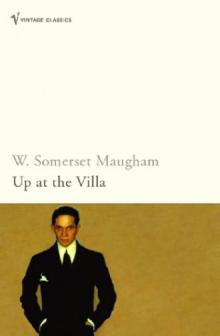 Up at the Villa
Up at the Villa The Razor's Edge
The Razor's Edge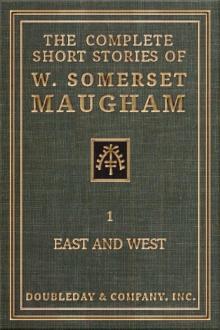 The Complete Short Stories of W. Somerset Maugham: East and West (Vol. 1 of 2))
The Complete Short Stories of W. Somerset Maugham: East and West (Vol. 1 of 2))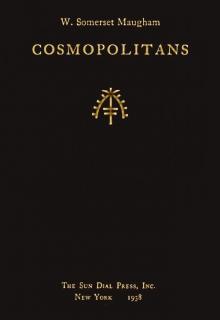 Cosmopolitans
Cosmopolitans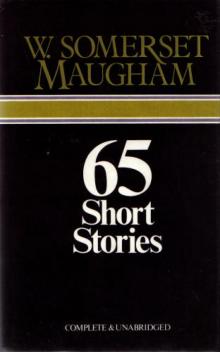 65 Short Stories
65 Short Stories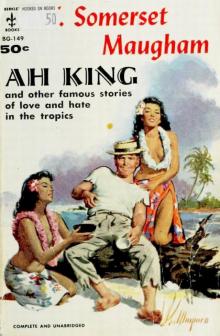 Ah King (Works of W. Somerset Maugham)
Ah King (Works of W. Somerset Maugham) Collected Short Stories: Volume 1
Collected Short Stories: Volume 1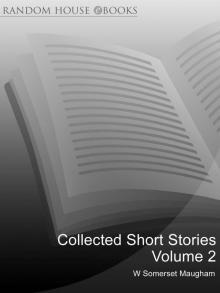 Collected Short Stories Volume 2
Collected Short Stories Volume 2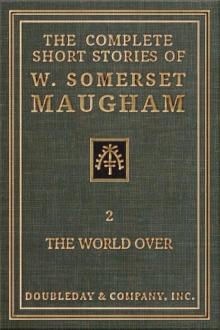 The Complete Short Stories of W. Somerset Maugham - II - The World Over
The Complete Short Stories of W. Somerset Maugham - II - The World Over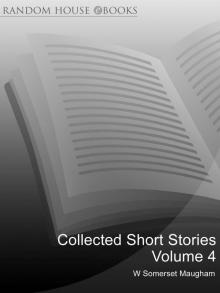 Collected Short Stories Volume 4
Collected Short Stories Volume 4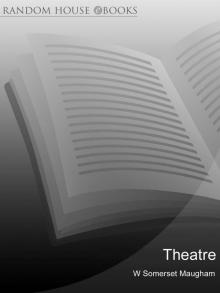 Theatre
Theatre Short Stories
Short Stories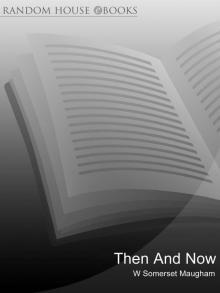 Then and Now
Then and Now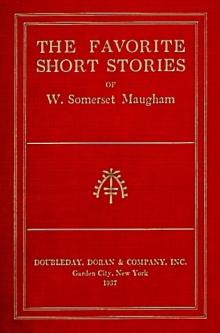 The Favorite Short Stories of W. Somerset Maugham
The Favorite Short Stories of W. Somerset Maugham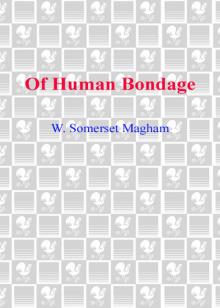 Of Human Bondage
Of Human Bondage The Magician
The Magician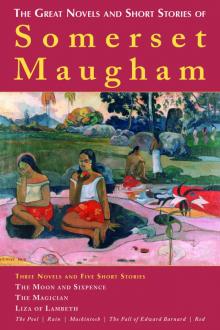 The Great Exotic Novels and Short Stories of Somerset Maugham
The Great Exotic Novels and Short Stories of Somerset Maugham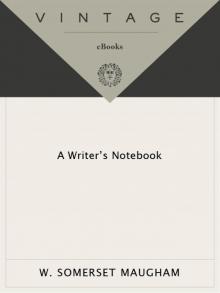 A Writer's Notebook
A Writer's Notebook Christmas Holiday
Christmas Holiday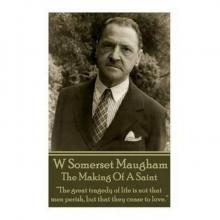 The Making of a Saint
The Making of a Saint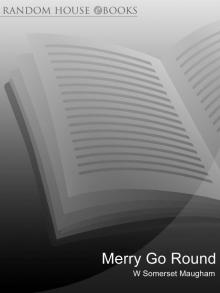 Merry Go Round
Merry Go Round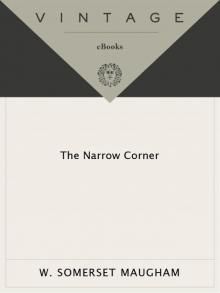 The Narrow Corner
The Narrow Corner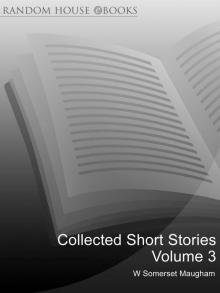 Collected Short Stories Volume 3
Collected Short Stories Volume 3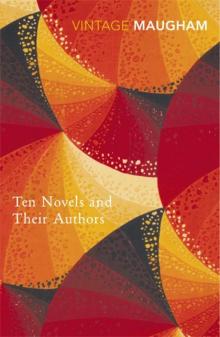 Ten Novels and Their Authors
Ten Novels and Their Authors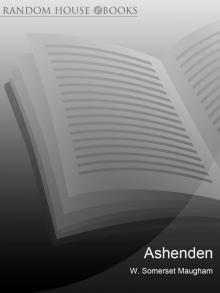 Ashenden
Ashenden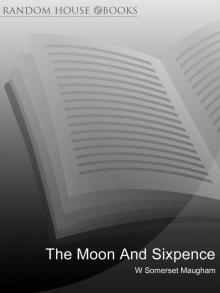 The Moon and Sixpence
The Moon and Sixpence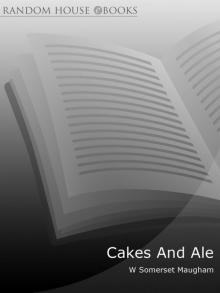 Cakes and Ale
Cakes and Ale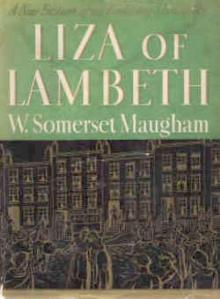 Liza of Lambeth
Liza of Lambeth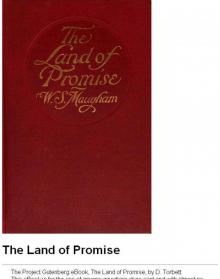 The Land of Promise: A Comedy in Four Acts (1922)
The Land of Promise: A Comedy in Four Acts (1922)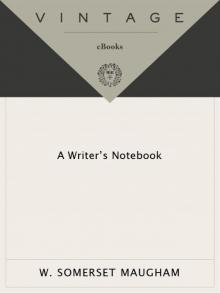 A Writer's Notebook (Vintage International)
A Writer's Notebook (Vintage International)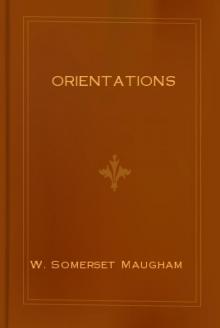 Orientations
Orientations Selected Masterpieces
Selected Masterpieces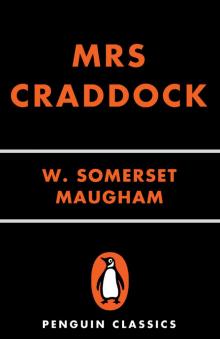 Mrs Craddock
Mrs Craddock The Skeptical Romancer
The Skeptical Romancer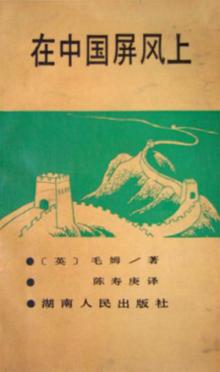 On a Chinese Screen
On a Chinese Screen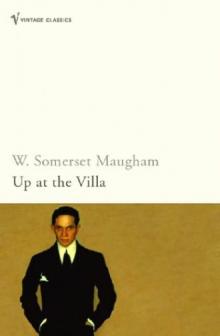 (1941) Up at the Villa
(1941) Up at the Villa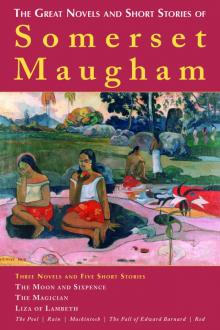 The Great Novels and Short Stories of Somerset Maugham
The Great Novels and Short Stories of Somerset Maugham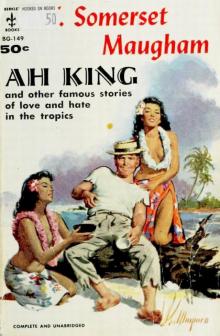 Ah King
Ah King The Explorer
The Explorer The Skeptical Romancer: Selected Travel Writing (Vintage Departures)
The Skeptical Romancer: Selected Travel Writing (Vintage Departures)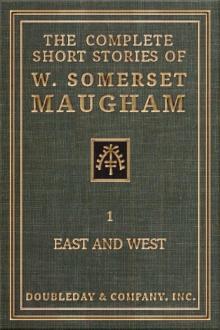 The Complete Short Stories of W. Somerset Maugham - I - East and West
The Complete Short Stories of W. Somerset Maugham - I - East and West